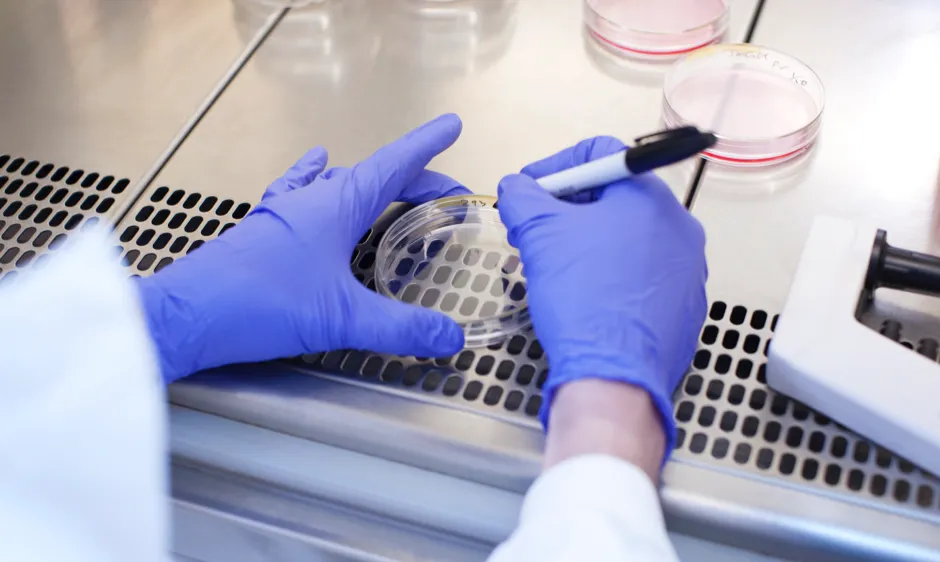Mouthwash can eradicate coronavirus within 30 seconds of being exposed to it in a laboratory, a scientific study has found.
The preliminary result comes ahead of a clinical trial into whether using over-the-counter mouthwash has the potential to reduce the levels of COVID-19 in a patient’s saliva.
The Cardiff University report said that mouthwashes containing at least 0.07 per cent cetypyridinium chloride (CPC) showed “promising signs” of being able to combat the virus.
The report – The Virucidal Efficacy of Oral Rinse Components Against SARS-CoV-2 In Vitro – is yet to be peer reviewed but supports another study published last week that found CPC-based mouthwashes are effective in reducing COVID-19's viral load.
Read the latest coronavirus news:
- Third COVID-19 vaccine ‘is 94.5% effective’, researchers say
- COVID-19: Infections 'will rise to pre-lockdown levels' with return to tier system
- Everything you need to know about the Pfizer coronavirus vaccine
The latest test was carried out by scientists at the university’s laboratory and mimicked the conditions of a person’s naso/oropharynx passage using mouthwash brands including Dentyl and Listerine.
A clinical trial will next examine how effective mouthwash is in reducing the viral load in the saliva of COVID-19 patients at the University Hospital of Wales in Cardiff, with its results due to be published in the first part of 2021.
Dentyl is the only UK mouthwash brand to take part in the 12-week clinical trial, which is led by Professor David Thomas from Cardiff University and titled: “The measurement of mouthwash anti-viral activity against COVID-19”.
The research showed that ethanol alone at had no effect on virus infectivity, which led scientists to write in their paper that "the inclusion of essential oils [such as in Listerine Cool Mint] or [the compound] LAE [found in Listerine Advanced] appears to be required for optimal efficacy."

“Whilst these mouthwashes very effectively eradicate the virus in the laboratory, we need to see if they work in patients and this is the point of our ongoing clinical study,” Dr Thomas told the PA news agency.
“It is important to point out the study won’t give us any direct evidence on viral transmission between patients, that would require a different type of study on a much larger scale.
“The ongoing clinical study will, however, show us how long any effects last, following a single administration of the mouthwash in patients with COVID-19.”
More about treating COVID-19:
- Llama-based antibody treatment 'neutralises' coronavirus
- Coronavirus: UK patients to test existing drugs as COVID-19 treatments
- Could hydroxychloroquine be used to treat COVID-19?
He added: “Although this in-vitro study is very encouraging and is a positive step, more clinical research is now clearly needed.
“We need to understand if the effect of over-the-counter mouthwashes on the COVID-19 virus achieved in the laboratory can be reproduced in patients, and we look forward to completing our clinical trial in early 2021.”
Dr Nick Claydon, a specialist periodontologist, said he believed the research was “very valuable”.
“If these positive results are reflected in Cardiff University’s clinical trial, CPC-based mouthwashes such as Dentyl used in the in-vitro study could become an important addition to people’s routine, together with hand washing, physical distancing and wearing masks, both now and in the future,” said Dr Claydon.
How can I protect myself from the coronavirus when shopping?
You’ll have seen signs in your local supermarket advising you to keep two metres from others while moving around the store. This is key to reducing your chances of catching the virus while shopping.
The coronavirus SARS-CoV-2 is spread through respiratory droplets that leave our mouth and nose when we cough, sneeze, or sometimes even talk. The droplets sprayed out by an infected person will contain the virus, which could then enter your body via your mouth, nose or eyes (this is why you shouldn’t be touching your face).
Respiratory droplets don’t usually travel more than one metre, so by keeping two metres from others, you’ll reduce the likelihood of being in the firing line. To make it easier to keep your distance, try to shop during off-peak hours, choose a store that’s limiting the number of people who can be inside at any one time, and use self-checkout if you can.
Keeping your hands clean is the other main thing you can do. If possible, wipe the trolley or basket handles with a disinfectant wipe when you arrive at the store. When you get home, wash your hands or use hand sanitiser before and after unpacking your bags.
A US study found that the coronavirus can survive for up to 24 hours on cardboard, and up to three days on hard, shiny surfaces such as plastic, so wiping down your purchases with a disinfectant spray or a soapy cloth before you put them away is another good habit to get into.
Read more:
